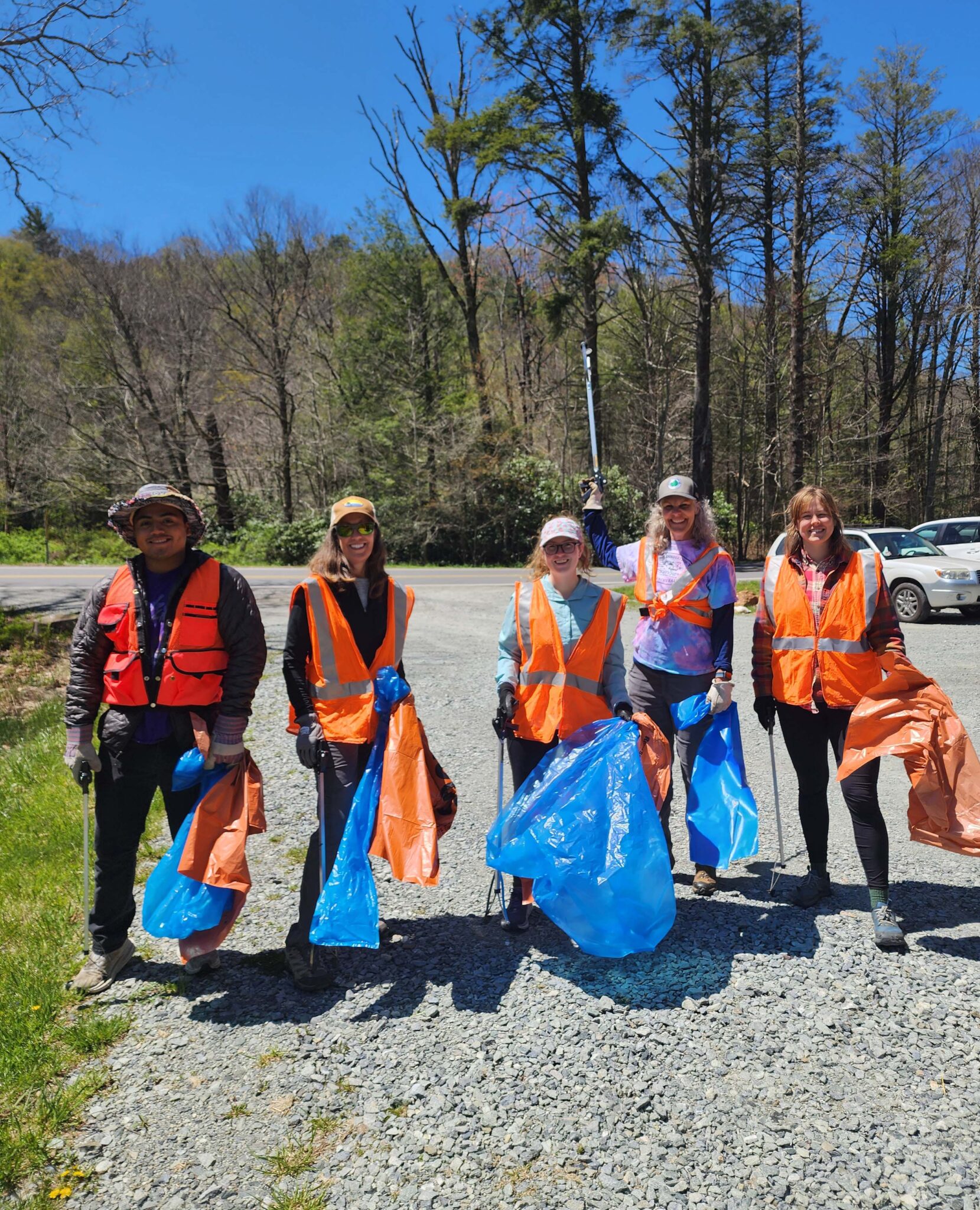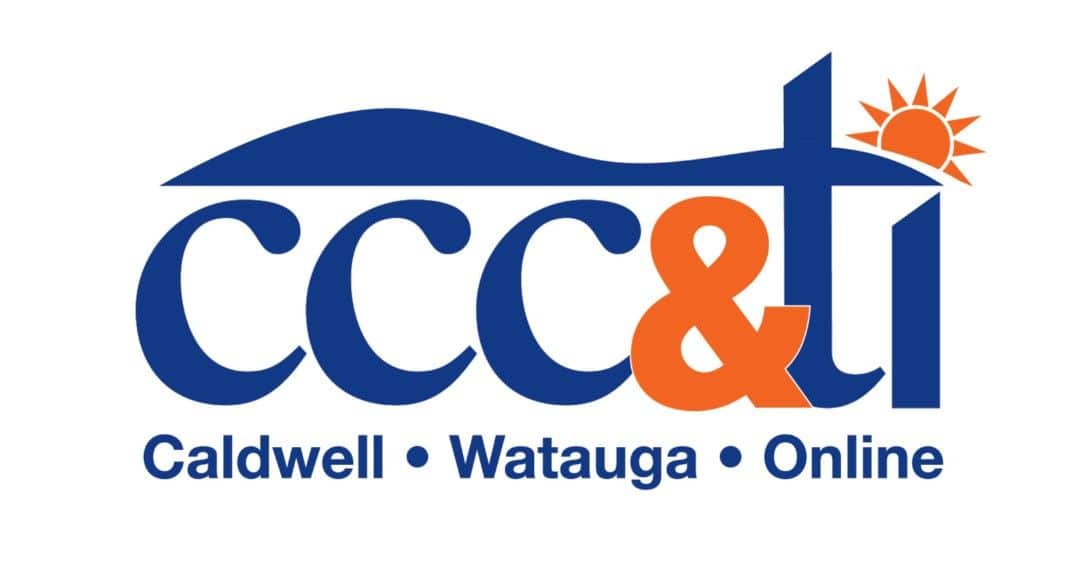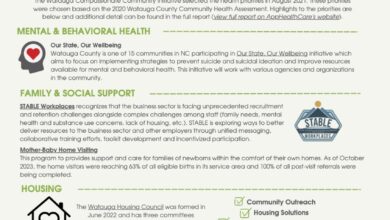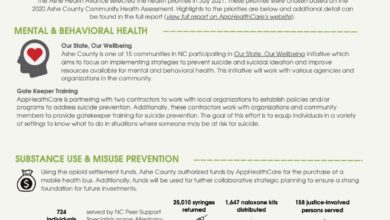Last Updated on February 12, 2022 4:15 pm
Two local agencies are among the $1.5 million in grant awards to implement projects that combat the opioid crisis by advancing the goals of the NC Opioid Action Plan,.
The announcement was made by Governor Roy Cooper on Thursday and includes 12 community partners. The one-time, state-funded grants of up to $150,000 from the North Carolina Department of Health and Human Services enable partner organizations to implement activities in their community which improve access to harm reduction, treatment and recovery supports.
The local agencies are Appalachian District Health Department, which serves Watauga, Ashe, and Allegheny counties, and the Watauga County Sheriff's Office.
Sheriff Len Hagaman tells WataugaOnline.com, “This is a result of a very innovative, and a totally “out of the box” approach by our current ASU Social Work intern, Mollie Mellishrencken, who graduated from ASU (BSW) in May and is currently in Graduate School (MSW).” Sheriff Hagman went on to say, “I was totally blown away by most of her findings. It is our hope that the funding of this DHHS will allow Mollie to put into place real solutions to her findings. I am confident that once implemented, by reducing recidivism, the grant will be repaid many times over, by reducing housing costs for identified inmates, and of most significance, that these inmates will be able to be successful and productive citizens.”
Jennifer Greene, Health Director for Appalachian District Health Department, tells WataugaOnline.com, “Mollie Mellishrencken and the Watauga County Sheriff’s Office has been such a big part of helping organize this grant effort. We are so grateful to have such a strong partnership.”
Greene went on to say, “Maria Julian, Director of Community Health Services, and our Community Health team will be helping us in coordinating efforts with this project. Based on our most current community health needs assessment, we know that these funds will allow us additional resources to address our community health priority of substance misuse and prevention.”
“Effective community-based actions are critical to combatting the ongoing opioid epidemic,” Greene added. “This grant will help build capacity to respond effectively to the epidemic in Alleghany, Ashe and Watauga counties, increasing the number of people we can connect to services.”
In explaining the details of her work, and findings, Mollie Mellishrencken tells WataugaOnline.com in an email statement:
“We were recently awarded the grant to continue the work that was piloted in the Detention Center earlier this year. In January we began interviewing chronic offenders that had a history of cycling in and out of the Detention Center in order to assess their barriers and challenges and pin point what we could do as a law enforcement office to address recidivism in our local community.
What we found was that virtually all of our population had chronic substance use issues and significant unmet needs that exacerbated their use and criminal behavior and that very few had access or exposure to appropriate resources or treatment.
An area of particular interest which was evaluated was the relationship between childhood trauma and susceptibility to addiction and incarceration. Among our population, 98% had experienced some form of trauma during the first eighteen years of life. Childhood trauma is broken up into three distinct categories- abuse, neglect, and household dysfunction. Among our population, 96% grew up with household dysfunction, meaning parents or caretakers were divorced, suffered from addiction or mental illness, were incarcerated, or that there was domestic violence in the home. 66% were raised in homes where there was physical, emotional, or sexual abuse. 56% were raised in physically or emotionally neglectful homes.
With this funding, the Sheriff's Office will hire a full time social worker to work directly with inmates to link them with treatment and support upon release as well as establish an opiate action program within the Detention Center that allows inmates with longer stays an opportunity to use their time to work on their recovery. In addition, we will establish a post-overdose response team. Currently, there is no follow up with those who have experienced a non-fatal overdose.
We believe much of the county’s population who suffer from persistent substance abuse and poor mental health funnel in and out of the county’s justice system, often going untreated for their underlying issues. Establishing a mental health and substance use professional would capture people in need who otherwise would not have access to treatment or support. We would be able to connect with a new population of people through the detention center and post-overdose response team. These programs have never been available to this population locally or in any surrounding counties. Currently, there is no follow up with those who have experienced a non-fatal overdose.
Later this Summer, the Watauga County Sheriff's Office will release our first Chronic Incarceration Report with the findings and implications of our research. It is our hope that the community will use these findings to better inform their practices in dealing with this population. Through this funding, it is our goal to create a more collaborative approach with the community for the release of inmates, and to hopefully have inmates leaving with more information and optimism than when they came in.”
“Community efforts to turn the tide on the opioid crisis deserve our support,” Gov. Cooper said. “These grants are another example of the collaborative effort we need to fight opioid overdoses, save lives, and connect people to treatment statewide.”
Other awardees are:
Appalachian Mountain Community Health Center (Serving Jackson, Graham, and Buncombe counties)
Bakersville Community Medical Clinic, Inc. (Serving Mitchell, Yancey, Avery, and McDowell counties)
C. W. Williams Community Health Center (Serving MecklenburgAnson, Cabarrus, Gaston, and Union counties)
Fayetteville Area Health Education Foundation, Inc. /Southern Regional Area Health Education Center (Serving Cumberland, Beaufort, Bertie, Bladen, Camden, Carteret, Chowan, Craven, Currituck, Dare, Gates, Greene, Harnett, Hertford, Hoke, Hyde, Jones, Lenoir, Martin, Moore, Onslow, Pamlico, Pasquotank, Perquimans, Pitt, Richmond, Robeson, Sampson, Scotland, Tyrell, Washington, and Wayne counties)
Haywood Pathways Center (Serving Haywood County)
Johnston County Public Health Department (Serving Johnston County)
Lumbee Tribe of NC (Serving Robeson, Cumberland, Hoke, and Scotland counties)
Metropolitan County Health Services, Inc. (Serving Martin and Beaufort counties)
Public Health Authority of Cabarrus County/ Cabarrus Health Alliance (Serving Cabarrus, Rowan, and Mecklenburg counties)
Scotland County Health Department (Serving Scotland County)
Wayne County Health Department (Serving Wayne County)
“These grants will provide local organizations with funding to make real changes in their communities,” said DHHS Secretary Mandy Cohen, M.D. “The overwhelming number of applications received shows there is significant need in communities across our state for funding and support to combat this epidemic.”
DHHS received 99 applications with projects covering all 100 counties across the state, with a total request of more than $12.5 million. Activities supported by the funding include:
- Funding certified peer support specialists and North Carolina certified peer support training.
- Connecting people involved in the justice system to harm reduction, treatment, and recovery supports, including establishing or expanding pre-arrest diversion programs like Law Enforcement Assisted Diversion (LEAD).
- Establishing post-overdose reversal response teams to prevent repeat overdose and connect those who have had a non-fatal overdose to harm reduction, treatment, and recovery supports.
- Training first responders, community members, or others on naloxone administration.
- Creating or expanding syringe exchange programs including referral networks for naloxone access and treatment services.
- Providing training on substance use disorders, Medication-Assisted Treatment (MAT) and naloxone administration to audiences that interact with people with substance use disorders and individuals receiving MAT.
- Projects were selected competitively based on factors including the potential impact, the assessment of need, organizational sustainability, and evidence of collaboration and community support.
The NC Opioid Action Plan was launched in June 2017, with collaboration from stakeholders across the state. The plan identified key strategies to combat the opioid epidemic, including expanding treatment and recovery oriented systems of care, making naloxone widely available, and linking overdose survivors to care. For more information about the plan and efforts to-date, visit www.ncdhhs.gov/opioid-epidemic.
















